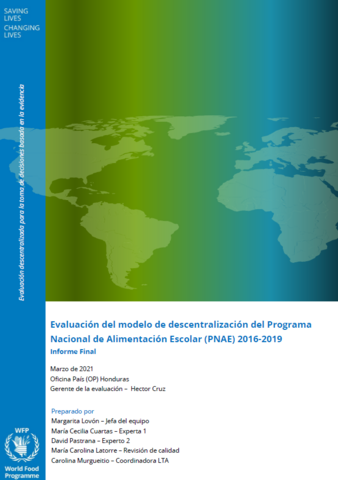
This decentralized evaluation was commissioned by the Honduras Country Office and covers the model of decentralization of the National School Feeding Programme and the years 2016 to 2019. It was carried out in 2020. The evaluation was commissioned to (i) provide evidence and recommendations to WFP on its role and on the capacities and resources necessary to accompany the decentralization model, (ii) inform government decision-making on the steps and conditions for the local implementation and expansion of the programme to other areas, (iii) provide recommendations in a view of a transfer to the Government (hand-over) of the operational management of the PNAE in the medium term. It was intended for both accountability and learning purposes. The evaluation focused on assessing the relevance, effectiveness, efficiency, impact, sustainability of the model. Overarching evaluation questions focused on the results of the programme, strategic positioning and adaptation of WFP, as well as local purchase strategy. The evaluation covered the following activities: (i) School Feeding, and (ii) Capacity strengthening.
Key evaluation findings included:
- The implementation of the model of decentralization of the national School Feeding programme proved to be viable and functional.
- The model showed to be effective to the extent that the delivery of the fresh ration had allowed the diversification of the diet of schoolchildren.
- The implementation and expansion of the decentralized model from 2016 to 2019 demonstrated the feasibility of the local purchasing strategy.
- The qualitative evidence showed the effectiveness of these purchases in generating economic benefits for male and female producers and their families.
- The capacities generated in the associations, producers and educational communities are considered to be mostly sufficient and are integrated into the institutional processes, which provides a good basis for the sustainability of the model.
The evaluation recommendations were centred around better positioning WFP in its capacity strengthening role (e.g. in the area of monitoring and evaluation or gender), as well as reviewing the engagement with partners, and advocating for more stable funding of the programme.
